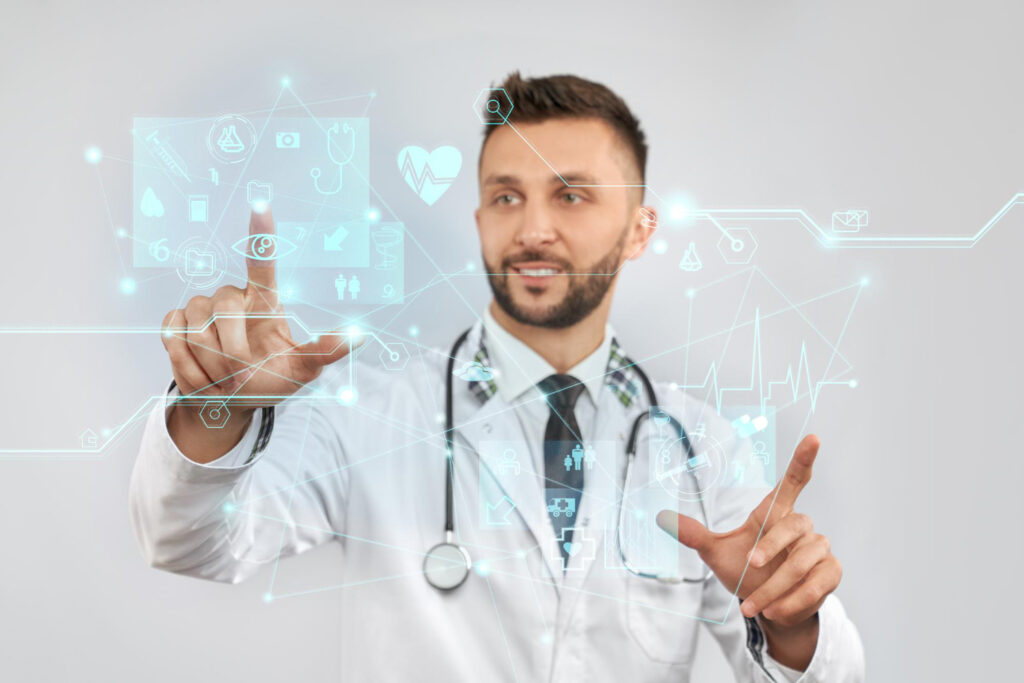How technology improves healthcare
The healthcare industry has seen enormous change over the past few years – driven by rapid advances in technology – from faster diagnosis and better treatments to increased accessibility and lower healthcare costs. Learn How technology improves healthcare across various sectors and what it means for the future of medicine.
The Digital Shift in Healthcare
The days of paper charts and manual records are fast coming to an end. Today’s healthcare systems are more interconnected, efficient, and patient-centric than ever before. At the core of this transformation is the adoption of digital technologies that streamline operations, enable better decision making, and enhance patient care.
From telehealth platforms and wearable devices to AI-powered diagnostic tools and robotic surgery, modern technology is redefining the way healthcare is delivered and experienced.
1. Telemedicine: Bringing Doctors Closer to Patients
As technology improves healthcare, one of the most notable ways in which this has happened is the rise of telemedicine. Remote consultations have become a common practice, especially during and after the COVID-19 pandemic.
Patients can now consult doctors via video calls, saving time and eliminating the need for physical travel. This is especially helpful in rural or remote settings where access to medical facilities is limited. Telemedicine platforms also help monitor chronic illnesses, provide mental health support, and provide follow-up care – all from the comfort of a patient’s home.
Key benefits:
-
- Reduced waiting time
-
- Increased access to specific patients
-
- Reduced travel and logistics costs
2. Electronic Health Records (EHRs): Smarter Patient Data
Electronic health records have revolutionized the way we store and access patient information. These digital records consolidate patient history, medications, lab results, and treatment plans into a centralized system that is accessible to standardized medical professionals.
This helps speed up the diagnosis process and improves continuity of care, especially when a patient sees multiple providers.
How EHRs improve care:
-
- Faster diagnosis and treatment
-
- Fewer medical errors
-
- Easier tracking of patient progress
3. AI and Machine Learning: Revolutionizing Diagnosis and Prediction
Artificial Intelligence (AI) is playing a vital role in detecting diseases quickly and accurately. AI-driven devices can analyze X-rays, MRIs, CT scans faster and often with greater accuracy than humans. Algorithms can spot early signs of diseases such as cancer, Alzheimer’s and even heart problems before they appear.
Machine learning models are also being used for predictive analytics that help healthcare providers identify patients at risk of hospitalization or disease progression. This enables proactive intervention and better resource allocation.
4. Wearables and IoT Devices: Real-Time Health Monitoring
Wearable devices like smartwatches and fitness bands have made health tracking mainstream. Devices from brands like Fitbit, Apple and Garmin can now monitor heart rate, sleep quality, oxygen saturation and more. This constant stream of data helps users stay in tune with their health and allows doctors to make more informed decisions.
The Internet of Things (IoT) in healthcare extends beyond wearables. Smart pill bottles, connected glucose monitors and wireless blood pressure cuffs can alert patients and providers in real time, ensuring better adherence to treatment plans.
5. Robotics and Minimally Invasive Surgery
Robotic systems such as the Dravid Surgical System are enabling surgeons to perform complex procedures with greater precision and less invasiveness. These systems translate the surgeon’s hand movements into smaller, more precise movements inside the patient’s body.
This advancement has the following benefits:
-
- Shorter hospital stays
-
- Less post-operative pain
-
- Lower risk of complications
Robotics is also being used in rehabilitation through robotic exoskeletons that help patients regain mobility after injuries or surgery.
6. Healthcare Apps: Empowering Patients
Mobile health apps enable users to take control of their health. These apps offer:
-
- Medication reminders
-
- Fitness tracking
Many apps to use How technology improves healthcare integrate with telehealth platforms or wearables, making them powerful tools for self-monitoring and early detection. They play an important role in preventive health care by facilitating patient participation
7. Cloud Computing: Scalability and Secure Access
Storing data in the cloud has provided greater flexibility and scalability to healthcare systems. Hospitals and clinics can now securely store large amounts of data and make it accessible to professionals across departments and even locations.
Cloud-based solutions also support the use of AI and big data analytics to study patient records and generate insights from real-time data sources.
8. Big Data and Personalized Medicine
Health service providers are using big data to uncover patterns that could improve patient outcomes. By analyzing huge datasets from diverse populations, researchers can identify genetic markers for diabetes and determine how different patients respond to treatments.
This has led to personalized medicine where treatment plans are tailored to a person’s genetic makeup, lifestyle, and environmental factors—leading to higher failure rates and fewer side effects.
9. The Future of How technology improves healthcare
Looking ahead, several emerging technologies are set to transform healthcare:
-
- Virtual Reality (VR): Used in pain management, surgical training and mental health care
-
- 5G: Fast real-time transfers are crucial for telesurgery and remote monitoring
-
- Blockchain: Simulated models of patients for secure and transparent medical record keeping
-
- Digital Twins: Simulated models of patients to predict treatment outcomes It is clear that the future of healthcare is more data-driven and connected than ever before.
10. Cybersecurity: Protecting Sensitive Medical Data
As healthcare data goes digital, cybersecurity is becoming more important. Technology is being used not just to store data, but also to keep it secure. Healthcare providers use advanced encryption access controls and AI-enabled threat detection to protect patient information from cyberattacks.

Conclusion: A Healthier World Through Innovation
Technology continues to be a key driver of the modernization of healthcare systems globally, making healthcare more accessible, efficient and personalized. Whether it is AI that predicts life-threatening diseases or wearable devices that keep us active, we are witnessing first-hand how technology improves healthcare.
As innovation accelerates, the gap between patients and quality care is rapidly closing. From rural to urban residents, everyone is benefiting from the combination of health and technology.
Ultimately, when we ask how technology improves healthcare, the answer lies in its ability to save lives, extend lifespans and make the entire system more responsive and personalized. We are living through a medical revolution – and it is driven by technology. [visit my another blog]



